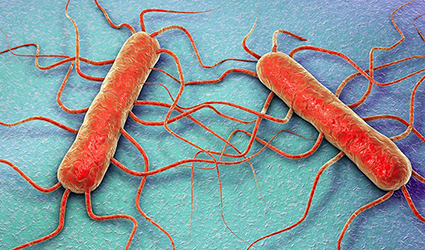Highly Resistant Food Poisoning Bug Responds to Antibiotics
September 6, 2018
Source: MedicalXpress
 1,696
1,696

Listeriosis is a deadly food-borne infection caused by consuming contaminated food like meats, soft cheese, salads, smoked salmon etc. Listeriosis is more dangerous for immunocompromised people including infants and the elderly. In pregnant women, this infection could even lead to miscarriage. Listeria always reproduces within the body cells and is called a food-poisoning bug but could potentially even affect the brain, for which only a few therapeutic options are available.
Hence a research team from the University of Edinburgh suggested that fosfomycin should be reconsidered. Though Listeria bacteria carry highly resistant genes based on early laboratory tests, they can respond to fosfomycin antibiotics as per further animal studies conducted in a lab. The study team also explained that when a bacteria infects the body, certain genes could be activated, which cancels the effect of a specific gene that destroys the drug effect.
The study was published in the journal PLOS Genetics, which was funded by the Wellcome Trust.
Professor Jose Vazquez-Boland, the lead investigator from the University of Edinburgh's Division of Infection Medicine, said "Our study focused on Listeria, but this important discovery may be relevant for other species of bacteria too. It is encouraging that we may be able to repurpose existing drugs in the race against antibiotic resistance."
By DduRead more on
- Things to Know before Buying Newborn Baby Incubators March 31, 2022
- Smartphone Based Diagnosis to Identify Mosquitoes Transmitting Infection September 5, 2018
- 3 Natural Plant Extracts Manufacturers on Drugdu.com September 4, 2018
- Shenzhen Chuanggan – Health Assessment Facility Supplier September 4, 2018
- Rosvin Surgico – General Examination Instruments Supplier September 4, 2018
your submission has already been received.
OK
Subscribe
Please enter a valid Email address!
Submit
The most relevant industry news & insight will be sent to you every two weeks.



